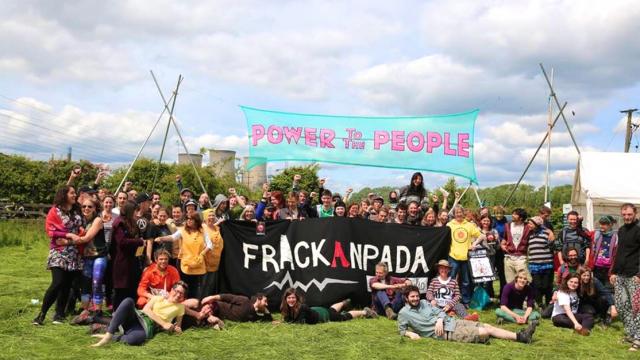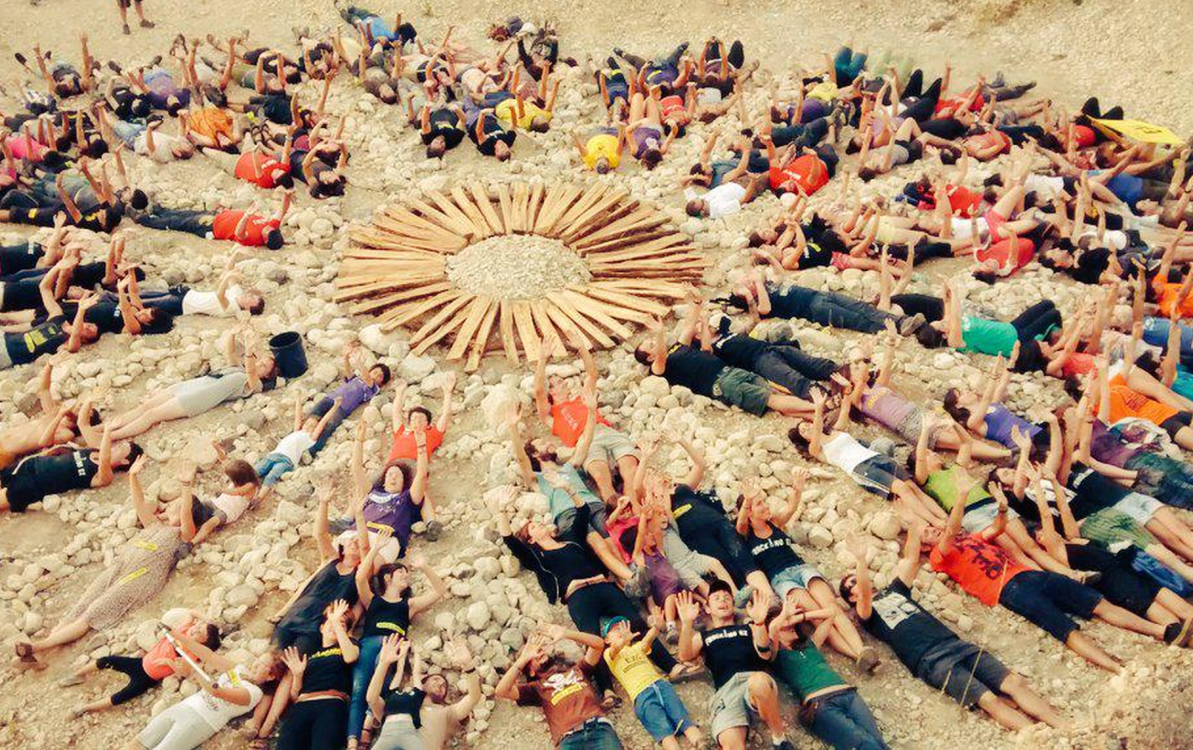
As global warming becomes more of an imminent reality, the excuses that have been made for nonrenewable resources aren't just falling on deaf ears – the ears are now angry, after being lied to for so long.
The tactics of deceit around climate change have especially been employed by pro-fracking corporations and governments – with obvious untruths, like the oxymoron “clean gas,” being sold to the very people who have seen their homes destroyed by the toxic chemicals employed in the drilling process. In the Pacific Northwest, fracking is still not a family-friendly dinner topic because of the polarized views on the left and right.
However, resistance to Big Oil is building fast as supporters of fracking (who are also usually its beneficiaries) are having their opinions drowned out by the reality of chemical spills and polluted, flammable drinking water. Now, [new scientific research](https://www.eeb.cornell.edu/howarth/publications/Howarth_2014_ESE_methan... / http://onlinelibrary.wiley.com/doi/10.1002/grl.50811/abstract) from the Environmental Protection Agency is further showing the effects of fracking – namely, that it is 21 times more harmful to the environment than carbon dioxide.
Who's Afraid of Fracking?
Long-term studies are also beginning to reveal methane's climate impact, which is worse than it was initially thought due to the way methane interacts dangerously with aerosols in the atmosphere (also injected there by us). What is truly alarming about the new research is that every natural gas extraction and storage site in the U.S, predominantly in places like Utah and Colorado, is leaking.
As a result, the terrifying rate at which methane is entering the atmosphere is several orders of magnitude larger than the figures reported by the oil industry. This recent study by National Oceanic and Atmospheric Association (NOAA) shows the true, horrifying scope of large-scale methane leaks in the U.S.
Regrettably, U.S. media continue to underreport the issue rather than challenge the giant dollar signs provided by one of their biggest corporate advertisers: the oil and gas industry. But since Josh Fox's powerful documentary "Gasland" was released in 2010, the protests have been growing. A notable anthem was inspired by Yoko Ono, whose song, "Don't Frack My Mother,", released along with John Lennon's son, Sean Lennon, and 18 other celebrities aligned with Artists Against Fracking, vocally took on the industry. Its effects have been far-reaching, with the song still played at anti-fracking concerts in Germany and elsewhere. (In response, the Independent Oil & Gas Association filed a formal complaint with the Joint Commission on Public Ethics, New York state's lobbying board, accusing Ono and Lennon of not registering as "lobbyists" before they released the song).
Mobilizing in the U.K. and Beyond
Although the U.S. is the country most aggressively fracking for gas, the protests here have paled in comparison to those held internationally. Large-scale anti-fracking protests involving hundreds of thousands have shaken cities worldwide, from the UK, France, Romania and Bulgaria to Australia and Algeria.
The global tumult began in earnest in 2011, when the activist group Frack Off launched its campaign in the UK by dropping a huge banner from the top of Blackpool Tower. Since then, organizers have been rallying protesters from rural communities across the country, and principally around Lancashire, where protesters stormed Cuadrilla Resources's drilling site in 2011 after the release of an independent report showed that two recent earthquakes in the UK were linked to fracking activities.
Following this, Frack Off and Campaign Against Climate Change in March 2012 set up “Camp Frack,” where organizers held the first of several multi-day protests. That same year there were also anti-fracking protests in Balcombe, Sussex, after 82 percent of residents opposed the process. This led to the No Dash For Gas camp involving more than 1,000 protesters in August 2013.
Meanwhile, the rate of arrests connected to the UK anti-fracking protests has grown at an alarming rate as British police adopt more confrontational strategies. At one point this included forcibly removing an 85-year-old disabled woman from a protest site by dragging her across a busy road. Even standers-by no longer feel safe – a 79-year-old woman serving tea to the protesters was arrested as well, becoming possibly the first person ever arrested for serving tea in England. As of July of this year, nearly 100 people had been arrested at anti-fracking protests nationwide; the protests in Lancashire continue still, with a recent demonstration last month leading to further arrests.
The slogan “farming not fracking” rallied the local rural community to join the anti-frackers, and on Nov. 17, Green Party MP Caroline Lucas called for an urgent debate on fracking in the UK. That same day, 12 protesters, including three county Councilors, were convicted for a protest in July and given $300 fines with 12 months conditional discharge. The protesters were found guilty of blocking a main road to a fracking site, but the Green Party’s Gina Dowding, one of those convicted, proudly told the BBC that she would do it again.
From 2012 through 2014, a series of anti-fracking protests spread across Bulgaria and Romania as well. Although Bulgaria responded by quickly banning fracking in 2012, in Romania hundreds of thousands gathered in Bârlad to protest the Environment Ministry's decision to issue permits for fracking. In 2013, the "Revolt of Pungesti" was anything but peaceful, as Romanian locals protested the oil giant Chevron after it obtained a building license for shale drilling in Vaslui County. The protests escalated when women, children and some elderly people threw firecrackers at police. The crowds were dispersed when police fired tear gas, and many claimed that the authorities used excessive force when restraining the protesters.
In response, 40 locals from Pungesti went on hunger strike along with others protesting the fracking plans. The demonstrations continued into 2014 until several dozen communities in Vaslui County were successful getting fracking banned and the plans brought to a halt.
Later, in 2015, Algeria took up the anti-fracking cause, and the Ain Salah protests that started in the Ahnet Basin spread across the country to Algiers. The protests began because of locals’ suspicions that the French oil multinational Total was fracking in Ahnet, despite the practice being illegal in France since 2011. The issue was compounded by the release of an independent report on Total and Algerian shale gas, which investigated the roles of both Algeria and France. This came two months after Total suddenly and inexplicably announced that it would no longer be participating in the Ahnet concession.
Russia Involvement
Meanwhile, the Kremlin may have actually supported many anti-fracking protests in Russia, according to U.S. intelligence. A U.S. government report on Russian interference in the U.S. elections, produced by the Office of the Director of National Intelligence, concluded that the Russian disinformation campaign also used the news network Russia Today (RT) to push an anti-fracking agenda as early as 2012.
Beyond that, allegations have emerged that illicit Russian funds may have made their way into the coffers of the San Francisco-based environmental group Sea Change Foundation, from a suspected Bermuda shell corporation known as Klein Ltd. Sea Change then issued grants to other environmental groups, some of which had an anti-fracking agenda. There is no evidence that either Sea Change or any of the recipients of grant money were aware of the source of the funding. However, the issue has become politicized with lawmakers on the right insisting the improprieties were intentional and calling for an investigation, while liberal Congress members contend it is a distraction to move media focus away from the Trump administration's own alleged Russian collusion investigation. They also claim it is a thinly veiled attempt to delegitimize the environmentalist movement as a whole.
Russia stands to benefit in many ways from funding anti-fracking protests. The first, of course, is by amplifying discord in the U.S., and the West generally, pushing divisive issues that create further political turmoil. Beyond a general desire to destabilize the post-Cold War balance of power, the Russian oil giant Gazprom also benefits by preventing Eastern Europe from developing its own energy reserves, increasing those countries' reliance on Russia. With Russia's economy so heavily reliant on oil and gas, preventing other nations from developing their own gas markets directly benefits their faltering economy.
If the Kremlin is indeed pushing an anti-fracking agenda, and has been doing so since 2011, we could view their efforts as part of a lead-up to Moscow's interference in the 2016 U.S. election, as well as its desire to destabilize the West generally. How ironic it would be if, ultimately, the world was saved from fracking by, yep, Russia. It’s a difficult position to be in when the enemy of your enemy isn’t exactly your friend, but instead an ex-KGB genocidal thug. Though Vladimir Putin might be helping prevent an existential threat to the planet for his own selfish reasons, he’s a difficult bedfellow for those on the left.
3 WAYS TO SHOW YOUR SUPPORT
- Log in to post comments












